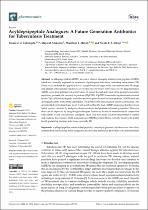| dc.contributor.author | Cobongela, Sinazo Z. Z. | |
| dc.contributor.author | Makatini, Maya M. | |
| dc.contributor.author | Sibuyi, Nicole R. S. | |
| dc.date.accessioned | 2022-10-11T08:19:29Z | |
| dc.date.available | 2022-10-11T08:19:29Z | |
| dc.date.issued | 2022 | |
| dc.identifier.citation | Cobongela, S. Z. Z. et al. (2022). Acyldepsipeptide analogues: A future generation antibiotics for Tuberculosis treatment. Pharmaceutics, 14(9),1956. https://doi.org/10.3390/pharmaceutics14091956 | en_US |
| dc.identifier.issn | 1999-4923 | |
| dc.identifier.uri | https://doi.org/10.3390/pharmaceutics14091956 | |
| dc.identifier.uri | http://hdl.handle.net/10566/8036 | |
| dc.description.abstract | Acyldepsipeptides (ADEPs) are a new class of emerging antimicrobial peptides (AMPs),
which are currently explored for treatment of pathogenic infections, including tuberculosis (TB).
These cyclic hydrophobic peptides have a unique bacterial target to the conventional anti-TB drugs,
and present a therapeutic window to overcome Mycobacterium Tuberculosis (M. tb) drug resistance.
ADEPs exerts their antibacterial activity on M. tb strains through activation of the protein homeostatic
regulatory protease, the caseinolytic protease (ClpP1P2). ClpP1P2 is normally regulated and activated
by the ClpP-ATPases to degrade misfolded and toxic peptides and/or short proteins. ADEPs bind and
dysregulate all the homeostatic capabilities of ClpP1P2 while inducing non-selective proteolysis. The
uncontrolled proteolysis leads to M. tb cell death within the host. | en_US |
| dc.language.iso | en | en_US |
| dc.publisher | MDPI | en_US |
| dc.subject | Acyldepsipeptides | en_US |
| dc.subject | Antimicrobial peptides | en_US |
| dc.subject | Tuberculosis | en_US |
| dc.subject | Mycobacterium tuberculosis | en_US |
| dc.subject | Pharmaceutics | en_US |
| dc.title | Acyldepsipeptide analogues: A future generation antibiotics for Tuberculosis treatment | en_US |
| dc.type | Article | en_US |

